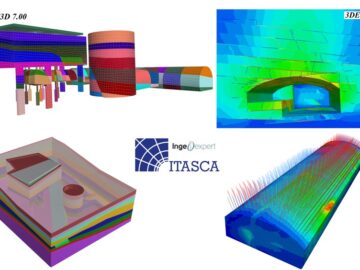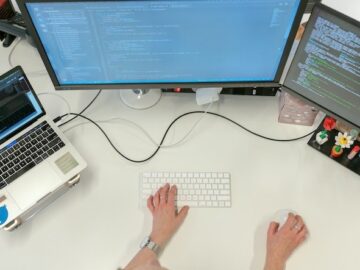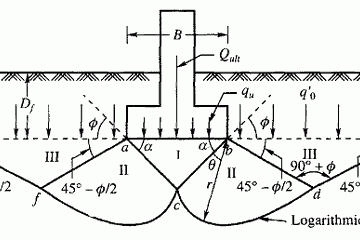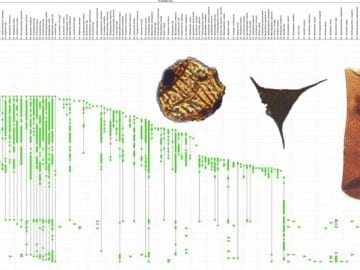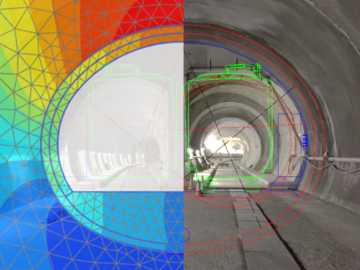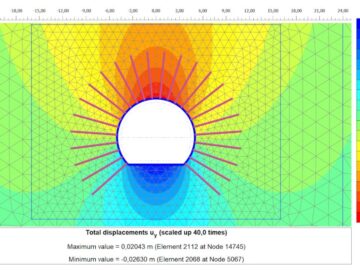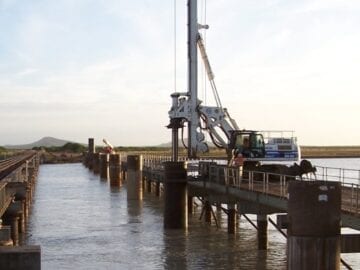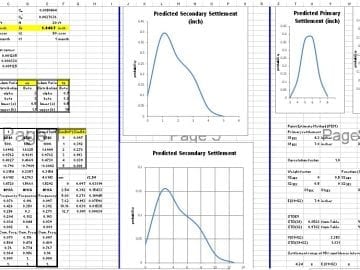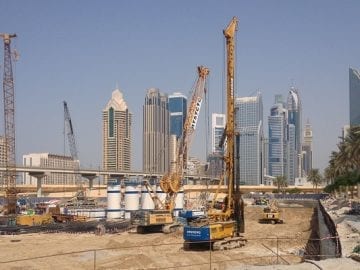Online geotechnical engineering courses: foundations, slope stability, embankments, soil consolidation…every geotechnical engineering area within your reach
Geotechnical Engineering
The field of geotechnical engineering, or geotechnics as it is often called, is a branch of civil engineering relating to the behavior of earth materials. Geotechnics is intensely focused on how soil, silt, mud, clays, rocks, and other combinations of the materials of the earth react and interact with human structures, and how these materials move and shift during earthquakes, landslides, or during heavy rains and flooding. Geotechnical engineering, therefore, is the indispensable foundation of every modern structure or building project, and long-term geotechnical analysis of existing structures is critical to the safety and reliability of our roads, bridges, and tunnels. Geotechnics is also at the heart of resource discovery and extraction.
Whether you are interested in a career specifically in geotechnics, or you are a practitioner looking to brush up on recent methods and software, our courses in geotechnical engineering provide the detailed information necessary for success in the field. Even for those students interested in other engineering or related fields, like architecture, a detailed understanding of geotechnical topics will provide much-needed insight.
Soil, Rock, and Earthworks
These courses focus on Earth’s materials themselves: the way that the mixtures of soil and rock interact and affect the built environment above. From how different types of rock structures interact over time, to how land slipping and landslips can be mitigated, these courses provide the bedrock to a complete understanding of geotechnics. The courses relating to soil and earthworks include:
– Soil Mechanics
– Rock Mechanics
– Rock Mass Zoning with Advanced Tools
– Terrain Improvement Techniques
– Geology and Mineralogy of Clays
– Land Containment Measures
Slopes and Tunnels
Slopes and tunnels have a lot in common, as in both cases, the job of the geotechnical engineer is to keep soil and rock stable during and long after construction. The long-term viability of structures built on or near slopes is a complex topic, and we offer numerous courses that delve into the calculations required for slope stability. Our courses designed to address the issue of slopes and tunnel design include:
– Modeling Landslides and Design of Dynamic Screens with Rocfall
– Geological Monitoring and Control During Rock Tunnel Excavation
– Slope Stability Calculation with Slide
– Slope Stability Calculation with GEO-SLOPE
– Structural Geotechnical Design for Tunnels
– Geological Risks of Slopes and Unstable Slopes
Foundations and Pile Design
Much of geotechnics revolves around the point at which the built environment touches the ground. Foundation design is critical to the overall design of any building or structure, and we offer a wide variety of courses to address many different types of foundations and pile systems. Our courses relating to building foundations and pile design include:
– Advanced Geotechnical Design of Shallow Foundations
– Advanced Geotechnical Design of Deep Foundations
– Global Stability of Foundations Near Slopes with Slide
– Micropiles: Design and Execution
– Advanced Shallow Foundations Subjected to static and seismic loads with application of SAP2000 and SAFE
– Pathology and Intervention in Building Foundations
– Foundations in Offshore Wind Installations
– Construction Procedures for Foundations and Containment Structures in Civil Works and Building
– Intermediate Structural Calculation
Seismology
Unfortunately, the earth’s materials are not static; rather, they are a dynamic system that can move in dramatic and dangerous ways, particularly during seismic activity, like earthquakes or after heavy rain. Designing buildings and foundations to mitigate damage is a critical part of the geotechnical engineer’s job, particularly in seismically active regions. Our seismology courses addressing geotechnical topics include:
– Basic Seismology
– Soil Liquefaction During Earthquakes: Fundamentals and Mitigation Techniques
– Calculation and Construction of Piles in Seismic Zones
– Geotechnical Analysis of Volcanic Terrain
Surveying and Fieldwork
For some geotechnical engineers, their job takes them out of the office and into the field, where they are responsible for the actual measurements and surveys upon which others later design. We offer several courses specifically focused on this aspect of geotechnical engineering, teaching methods and how to read instrumentation to provide accurate data. Our courses that describe and teach geotechnical surveying and fieldwork include:
– Field Geotechnical Surveying
– Geotechnical Instrumentation in Civil Engineering and Mining Projects
– Geotechnical Test Interpretation
Software
Geotechnics relies heavily on the use of specific software packages to aide in calculation and geotechnical design. It is increasingly necessary that engineers and architects understand how to use this software to get the full benefit from a geotechnical analysis. Our courses relating to geotechnics and geotechnical engineering software include:
– Excel for Engineers
– Numerical Modeling Course with PLAXIS 2D
– Introduction to Modeling with FLAC3D
– Sheeting Wall Modeling with Plaxis 2D
– AutoCAD Civil 3D course applied to Geology and Topography
– Geotechnical Modeling Course with Dips, Swedge and Unwedge
– Introduction to Calculation of Structures with ETABS
Hydrogeology
For nearly every built structure, water is a serious challenge. Much of civil engineering is the science of how to mitigate the risk of running water, whether in ordinary conditions or in disasters like flooding or severe storms. Geotechnical engineers must understand the interaction of water and the built environment, its movement, and how to address water issues. Our courses related to hydrogeology and groundwater include:
- – Applied Hydrogeology
- – Groundwater Containment and Control Procedures Course in Civil Engineering and Building Works
- – Numerical Simulation of Groundwater with Visual MODFLOW
- – Modeling Flow and Transport of Pollutants in Groundwater with Visual Modflow
- – Filtration Networks in the Field: Introduction to Modeling with SEEP/W
- – Introduction to Dam Design, Construction and Operation
Resource Extraction
Geotechnics is not only concerned with the effects of structures built on top of the Earth’s materials; the modern economy also relies heavily on resources we remove from the ground. Geotechnical engineers use a variety of techniques to find useful resources and design safe and efficient extraction methods for these materials. For those interested in this field, the knowledge of these methods can provide a gateway into rewarding careers in resource extraction. Our courses that focus on resource discovery and exploitation include:
- – Analysis and Characterization of Igneous and Metamorphic Rocks and Their Associated Natural Resources
- – Intermediate Geotechnical Reconnaissance Drilling: Witnessing, Interpretation and Instrumentation
- – Underground Mining Exploitation Methods course
- – The Land Seismic Method Applied to the Search for Hydrocarbons
- – Detection of Geotechnical Anomalies in the Field and Drilling: Karstification and Subsidence
How Do Our Geotechnical Engineering Classes Work?
We offer all our geotechnical engineering courses through a virtual campus that is entirely online. We offer courses written and taught by experts in the field, and our professors present their material through a wide variety of engaging methods. The core of the classes is the videoconference, where professors can engage with the students in real-time discussions about course material. After each lecture, the student will complete interactive coursework, which focuses heavily on practical cases and worked examples. This focus on real-world cases will ensure that students will leave the class with the practical knowledge ready to apply in their careers. The purpose of our courses, above all, is to equip and train students to apply their knowledge.
Each course is designed to be completed over the course of several weeks, but all students can review the material at their own speed. We regularly update the content of our courses to ensure that the material taught meets the rigorous standards of modern geotechnical engineering.
Outside of the videoconferences, we have also created a forum for each class, so that students and teachers can continue their engagement well after the class period has ended. Students also may email the teachers directly to receive help on a particularly troublesome problem. This system of peer-to-peer and teacher-student tutoring is one of our program’s most useful features, as it helps reinforce learning and ensures a well-rounded knowledge of the subject.
Finally, even after the completion of the course, students may download all course materials, including video lectures and practical examples. Having these materials as reference will serve as a boon to new engineers or established professionals.
Do I Receive a Certification Upon the Completion of the Course?
Once the course is complete, students perform an assessment evaluation to determine whether the student has successfully mastered the material. Each student who successfully completes the evaluation will be provided an academic certificate issued by Ingeoexpert confirming that the student has demonstrated proficiency. This certificate is secured by blockchain technology to prove to prospective employers and other academic institutions that it is authentic. This certificate can be downloaded and shared as the student wishes.
Learn More About our Courses
Our course pages offer much more information about the professor, the teaching methodology, course syllabus, and more. We focus on providing detailed courses that address specific and highly relevant geotechnical engineering topics, and we have enlisted a team of skilled professionals to ensure that we can offer the most up-to-date information.
Whether you are already a professional looking for a refresher class, or a newcomer hoping to start a career in geotechnical engineering or another related field, our courses offer you the content you need to succeed. Our goal is to provide our students with the best training by the best teachers, using our virtual campus to give our students the best opportunity for education.


